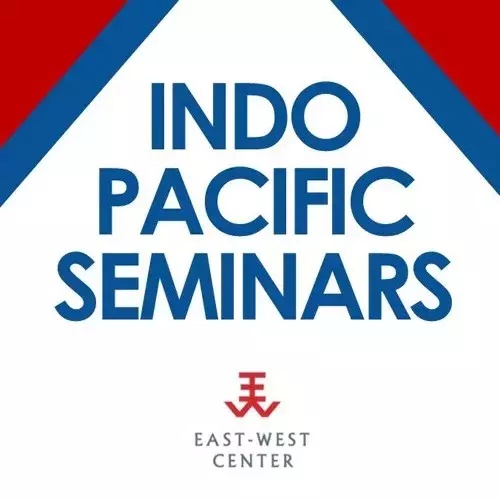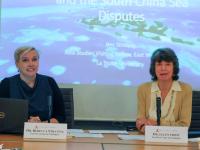Error message

OFFICE/DEPARTMENT
Defending Maritime Interests in the Indo-Pacific: Regional Powers and the South China Sea Disputes
An Indo-Pacific Foreign Policy and Defense Seminar featuring:
Dr. Rebecca “Bec” Strating
Asia Studies Visiting Fellow,
East-West Center in Washington
Dr. Ellen L. Frost (Moderator)
Senior Advisor & Fellow, East-West Center in Washington
Over the last decade, territorial and maritime disputes in the South China Sea (SCS) have intensified. The disputes are complex and multifaceted: they include overlapping sovereignty and maritime jurisdictional claims; contests over freedom of

navigation; and concerns over militarization, artificial island-building, and the use of ‘grey zone’ tactics. The SCS has become a highly visible microcosm of broader disputes between the US-led regional security order, challenging conceptions of order that see a bigger role for rising powers in generating new rules and providing alternative interpretations of international law. The United States’ 2019 Indo-Pacific Strategy Report outlined expectations that allies and partners would contribute to defending the regional ‘rules-based order’ by adequately resourcing their own defense; strengthening interoperability with the US; promoting Indo-Pacific initiatives; and, importantly, ‘flying, sailing, and operating to uphold international laws and norms’ in and above the seas. Given the emphasis on security networks as a crucial plank in defending the rules-based status quo, a key question is whether these states share similar conceptions of regional order, maritime rules, and strategic interests. What are the stakes for regional non-claimant states in specific theaters of contestation, such as the South China Sea? How do these states act to preserve their interests? This presentation will attempt to address these questions by comparing the interests and approaches of regional, middle, and small Indo-Pacific states.
Read Dr. Strating's Asia Pacific Bulletin on this issue.
For more images, please visit the album for this event on the East-West Center's Flickr page.
SPEAKER BIOGRAPHIES
Dr. Strating is a Senior Lecturer in Politics and International Relations in the Department of Politics, Media and Philosophy at La Trobe University in Melbourne. Her current research interests include maritime disputes in the Indo-Pacific and Australian foreign policy. Bec received her PhD in politics from Monash University, Victoria in 2013. In her academic career, she has published two monographs, numerous scholarly articles, and book chapters. Her latest book, The Post-Colonial Security Dilemma, was published by the Institute of Southeast Asian Studies in 2019. In 2018, her article on the Timor Sea maritime dispute was awarded the prestigious Boyer Prize by the Australian Institute of International Affairs for best article published in the 2017 Australian Journal of International Affairs. Bec contributes regularly to public debates about politics and foreign policy in media and policy forums, and has testified in Australian federal parliament as an expert witness. She tweets at @becstrating.
Dr. Ellen L. Frost is a Senior Advisor and Fellow at the East-West Center and a Visiting Distinguished Research Fellow at the National Defense University's Institute of National Strategic Studies. She writes and lectures frequently on Asia-related topics, especially Indo-Pacific political-economic issues and their strategic and security implications. Her most recent book is Asia's New Regionalism. She is also the author of For Richer, For Poorer: The New U.S.-Japan Relationship and Transatlantic Trade: A Strategic Agenda. Dr. Frost previously served in the US government as Counselor to the US Trade Representative (1993–95), Deputy Assistant Secretary of Defense for International Economic and Technology Affairs (1977-81), various positions in the Treasury Department (1974–77) and the State Department (1963), and as a legislative assistant in the US Senate (1972–74). During the 1980s she worked for two multinational corporations. From 1996 to 2014 she was a senior fellow and subsequently visiting fellow at the Institute for International Economics. She received a B.A. from Radcliffe College, an M.A. from the Fletcher School of Law and Diplomacy, and a Ph.D. in Government from Harvard University.
Defending Maritime Interests in the Indo-Pacific: Regional Powers and the South China Sea Disputes
An Indo-Pacific Foreign Policy and Defense Seminar featuring:
Dr. Rebecca “Bec” Strating
Asia Studies Visiting Fellow,
East-West Center in Washington
Dr. Ellen L. Frost (Moderator)
Senior Advisor & Fellow, East-West Center in Washington
Over the last decade, territorial and maritime disputes in the South China Sea (SCS) have intensified. The disputes are complex and multifaceted: they include overlapping sovereignty and maritime jurisdictional claims; contests over freedom of

navigation; and concerns over militarization, artificial island-building, and the use of ‘grey zone’ tactics. The SCS has become a highly visible microcosm of broader disputes between the US-led regional security order, challenging conceptions of order that see a bigger role for rising powers in generating new rules and providing alternative interpretations of international law. The United States’ 2019 Indo-Pacific Strategy Report outlined expectations that allies and partners would contribute to defending the regional ‘rules-based order’ by adequately resourcing their own defense; strengthening interoperability with the US; promoting Indo-Pacific initiatives; and, importantly, ‘flying, sailing, and operating to uphold international laws and norms’ in and above the seas. Given the emphasis on security networks as a crucial plank in defending the rules-based status quo, a key question is whether these states share similar conceptions of regional order, maritime rules, and strategic interests. What are the stakes for regional non-claimant states in specific theaters of contestation, such as the South China Sea? How do these states act to preserve their interests? This presentation will attempt to address these questions by comparing the interests and approaches of regional, middle, and small Indo-Pacific states.
Read Dr. Strating's Asia Pacific Bulletin on this issue.
For more images, please visit the album for this event on the East-West Center's Flickr page.
SPEAKER BIOGRAPHIES
Dr. Strating is a Senior Lecturer in Politics and International Relations in the Department of Politics, Media and Philosophy at La Trobe University in Melbourne. Her current research interests include maritime disputes in the Indo-Pacific and Australian foreign policy. Bec received her PhD in politics from Monash University, Victoria in 2013. In her academic career, she has published two monographs, numerous scholarly articles, and book chapters. Her latest book, The Post-Colonial Security Dilemma, was published by the Institute of Southeast Asian Studies in 2019. In 2018, her article on the Timor Sea maritime dispute was awarded the prestigious Boyer Prize by the Australian Institute of International Affairs for best article published in the 2017 Australian Journal of International Affairs. Bec contributes regularly to public debates about politics and foreign policy in media and policy forums, and has testified in Australian federal parliament as an expert witness. She tweets at @becstrating.
Dr. Ellen L. Frost is a Senior Advisor and Fellow at the East-West Center and a Visiting Distinguished Research Fellow at the National Defense University's Institute of National Strategic Studies. She writes and lectures frequently on Asia-related topics, especially Indo-Pacific political-economic issues and their strategic and security implications. Her most recent book is Asia's New Regionalism. She is also the author of For Richer, For Poorer: The New U.S.-Japan Relationship and Transatlantic Trade: A Strategic Agenda. Dr. Frost previously served in the US government as Counselor to the US Trade Representative (1993–95), Deputy Assistant Secretary of Defense for International Economic and Technology Affairs (1977-81), various positions in the Treasury Department (1974–77) and the State Department (1963), and as a legislative assistant in the US Senate (1972–74). During the 1980s she worked for two multinational corporations. From 1996 to 2014 she was a senior fellow and subsequently visiting fellow at the Institute for International Economics. She received a B.A. from Radcliffe College, an M.A. from the Fletcher School of Law and Diplomacy, and a Ph.D. in Government from Harvard University.









